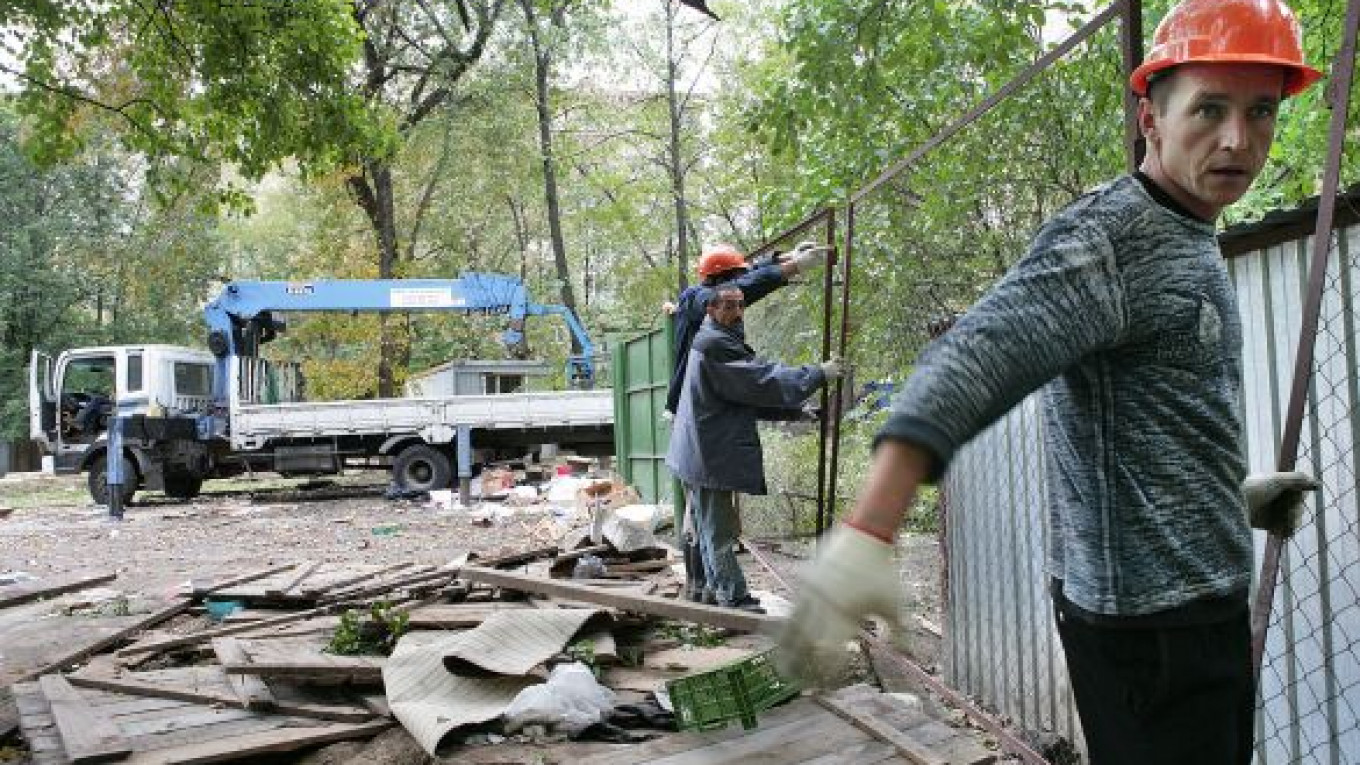Residents of two apartment buildings in a quiet neighborhood of northeastern Moscow are fighting to save their shared yard after authorities began bulldozing trees to make way for a kindergarten that locals say is unneeded.
Moscow banned most infill development in 2007, when soaring real estate prices were driving builders to pack whatever they could into vacant or underused plots of land in already developed areas. The buildings — typically shopping centers or apartments — were widely protested in Moscow for noisiness and crowding neighborhoods.
Anastasia Novikova, 37, is among dozens of Muscovites who are fighting to save the yard between 14 Ulitsa Pavla Korchagina and 11 Rizhsky Proyezd, north of the Alexeyevskaya metro station.
They say authorities want to build the new kindergarten so that they can destroy another one nearby, allowing the area to be commercially developed.
“My children will have nowhere to go for a walk,” Novikova, a mother of two boys, 7 and 10 years old, told The Moscow Times at a protest outside the office of the prefect of her Northeast Administrative District.
The large Sokolniki park, while nearby, is separated from the buildings by a railroad, and residents say they preferred their cozy nook, with its trees and playground. Novikova says her mother helped plant the trees as a young girl in the 1950s.
But the trees were destroyed late last month after construction workers — backed by several riot police officers — started clearing the area for construction.
“Workers pulled down benches while old people were on them and swings while children were on them,” said Inna Kordonskaya, a senior citizen who resides in the building on Ulitsa Pavla Korchagina.
The yard is supposed to house a kindergarten for 95 children that would accommodate some of the roughly 300 kids in the Alexeyevsky district who cannot get into existing kindergartens because they are full, Irina Raber, prefect of the Northeast Administrative District, said in a telephone interview.
But Novikova said residents discovered several former kindergartens in the district that are either leased for other purposes or simply empty. An existing kindergarten on Ulitsa Pavla Korchagina could also be enlarged to accommodate, said Kordonskaya, citing inquiries residents made to local officials.
Raber said the district was “densely developed,” which forced them to “build in places where legal norms for city planning allowed.”
The area’s residents, however, suspect that the existing kindergarten on Ulitsa Pavla Korchagina would be destroyed to make place for commercial construction. The much-criticized general plan for Moscow’s development, passed earlier this year, includes this building in a list of territories allotted for development.
Raber denied speculation that the kindergarten would be knocked down to make way for another building.
“The existing kindergarten will continue to work; no one is going to demolish it,” she said.
Commercial development of the yard where the new kindergarten is to be built would be prohibited by city regulations because it would qualify as infill construction, residents say. But a kindergarten is not considered infill construction because it is noncommercial.
Supporters of infill construction argue that it is an efficient, flexible and economic way to use the city’s land and existing infrastructure.
In the case of the new kindergarten on Ulitsa Pavla Korchagina, the locals lose a yard and parking lot. Residents whose windows face the building could have reduced sunlight.
There have been no public hearings on the development of the district, which is a violation of residents’ rights, Veronika Mayorova, another local resident, told The Moscow Times.
Complaints have been lodged with district, city and federal authorities, but residents have only received “runaround replies,” Kordonskaya said.
Raber, the local prefect, defended the use of riot police, saying they were “needed to secure order” after residents allegedly set fire to a cabin used by construction workers before work on the yard was able to start.
“The actions of riot police were not aimed at harming the residents,” Raber said.
But a Moscow police spokeswoman said city police did not send officers to Ulitsa Pavla Korchagina in late August.
Kordonskaya said residents saw an unidentified man throwing a burning package into the window of the cabin. No one has been detained in connection with the fire.
This is not the first incident of Moscow residents fighting City Hall construction plans.
Residents of 15 Soviet-era apartment buildings on 1st Khoroshyovsky Proyezd in northern Moscow have been engaged in a battle to save their houses from demolition to make way for a new school and kindergarten since 2006.
Locals say the demolition order, which declares their buildings to be dilapidated, is inaccurate and illegal.
In 2007, residents of an apartment building on Standartnaya Ulitsa, near the Bibirevo metro station in the Northeast Administrative District, opposed plans to construct a 14-story apartment building in a local yard.
The construction site was situated about three meters from the apartment building, and the residents — who failed to stop development plans — had to wake up to deafening noise from the construction every morning for about six months.
A Message from The Moscow Times:
Dear readers,
We are facing unprecedented challenges. Russia's Prosecutor General's Office has designated The Moscow Times as an "undesirable" organization, criminalizing our work and putting our staff at risk of prosecution. This follows our earlier unjust labeling as a "foreign agent."
These actions are direct attempts to silence independent journalism in Russia. The authorities claim our work "discredits the decisions of the Russian leadership." We see things differently: we strive to provide accurate, unbiased reporting on Russia.
We, the journalists of The Moscow Times, refuse to be silenced. But to continue our work, we need your help.
Your support, no matter how small, makes a world of difference. If you can, please support us monthly starting from just $2. It's quick to set up, and every contribution makes a significant impact.
By supporting The Moscow Times, you're defending open, independent journalism in the face of repression. Thank you for standing with us.
Remind me later.






